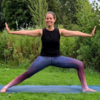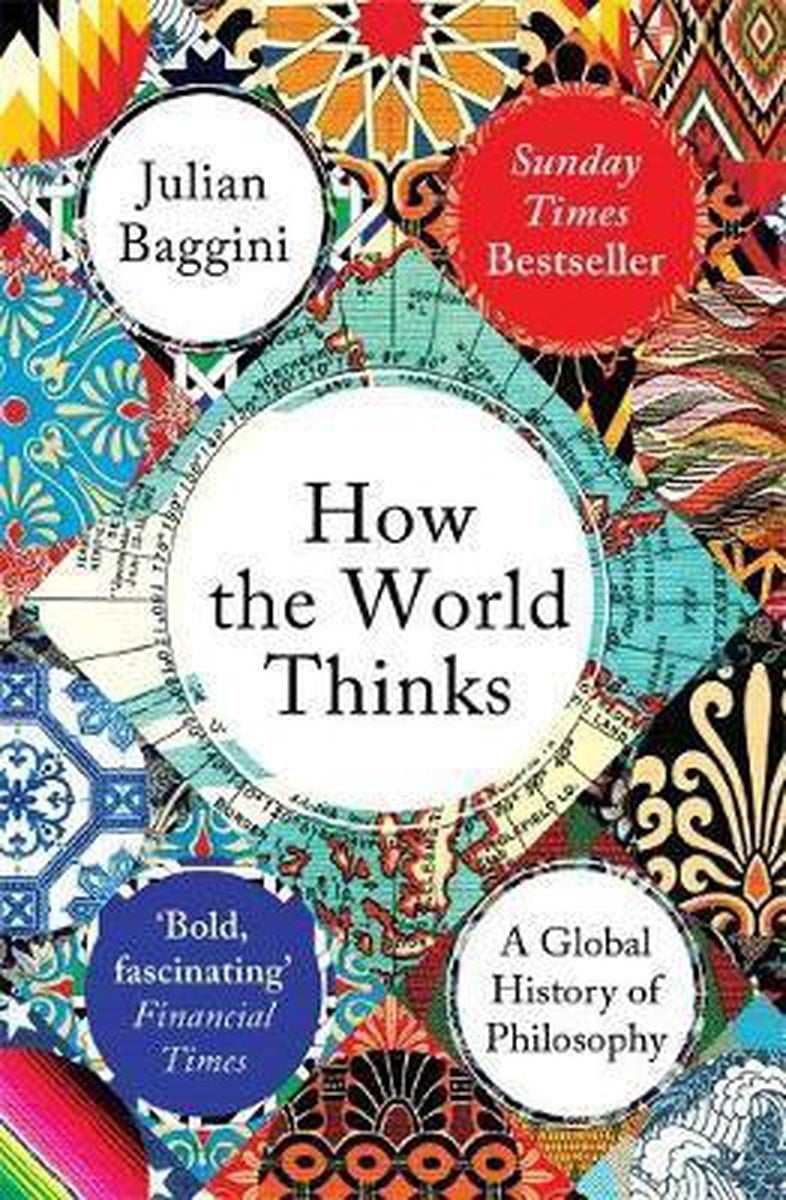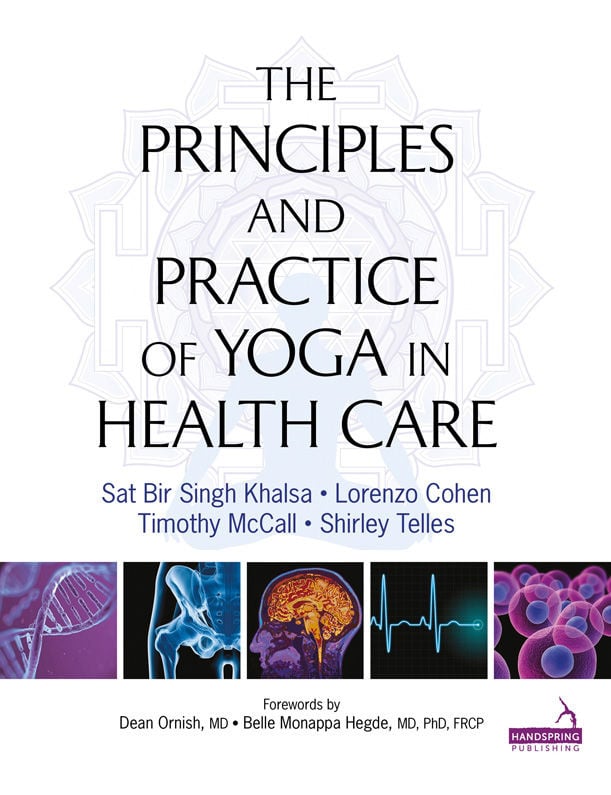I met Lana at the Svastha Yoga Therapy training. Although yoga in itself is therapeutic in nature, yoga therapy helps to tailor it even more to the individual. Since Lana is both a yoga teacher and a psychologist, I was very curious about her view on dharma, energy and yoga.
About Lana Donse
As a yoga teacher and psychologist, Lana specializes in yoga therapy. Yoga is a comprehensive lifestyle with various elements that can help you improve your health. Integrating this with knowledge from psychology and modern science creates a broad approach to physical and mental health that can be applied to everyone's personal needs. “I personally find it exciting to contribute to the developments in this promising field. But above all, I hope to help everyone I work with as well as possible by researching together how yoga can help to be healthy, powerful and feel connected in life. ”
How has your yoga practice changed your view on the subject energy?
Yoga philosophy and Taoism have taught me a lot about concepts such as "prana" and "chi", often translated as "life energy". Before I got involved with that I often found it a bit vague and woolly (but interesting). I was academically trained and I was mainly looking for rational evidence for everything, according to the empirical / scientific method. My yoga courses and my search for a broader perspective have certainly changed that!
For example by doing tai chi, pranayama and yin yoga, it suddenly became tangible. I can now really experience the idea that life energy is present in everything, and that you can let energy flow freely within yourself with the help of all kinds of relatively simple exercises.
What does the word dharma mean to you? And what is your dharma (as you understand it today)?
To be honest, I am not so sure that I understand exactly what dharma means and what "my dharma" is. It is a concept of yoga philosophy that is so profound, and intertwined with the concept of karma that you build from past lives, that for someone who grew up in a Western culture like me, I think it could be easily misunderstood. So I keep learning about that.
It is often said that your dharma is a mission or life purpose, depending on events from previous lives. Since it could present itself so unconsciously, I don't know if I could explicitly name my dharma. As far as I understand it, this is also something that you have little control over.
If I could say something about my overarching goals in life, I think I want to help other people find more harmony and freedom in their lives. I can do that by helping them on their way in their personal development - whether from my work as a psychologist or yoga teacher, in both areas I help others improve their mental health and everything related to it. I also hope to contribute to a greater whole, a healthier and more balanced world. And I think that is in line with the core of many Eastern (and by the way also Western) philosophical movements, including the idea of dharma. :)
What are the elements of your yoga practice? And if that contains more than practicing yoga postures, could you tell us more about this?
I always start with a short meditation to see how I am doing. From there I start with a yoga series that fits. This is often a bit more powerful, because I have a sedentary profession (I work 32 hours a week as a psychologist, where I spend a lot of time at a desk and computer). Then it becomes a flow with sun salutations, followed by alternating postures that are more strenuous and relaxing. I used to do a fixed series, but with the help of yoga therapy I learned to adjust the exercises to the moment. My practice is also increasingly inward looking; over the years there has gradually been more space to also do breathing exercises / pranayama and meditation or yoga nidra.
Furthermore, I really see yoga as a lifestyle that is integrated in my life; by learning about yoga philosophy and the relationship you have to yourself and the world around you, it becomes increasingly intertwined with everything I do. I see that as an exercise and therefore part of my practice!
To practice yoga daily, year in year out, asks for a lot of discipline and self compassion. What has helped you to create this habit?
Personally, I've actually liked a morning ritual all my life. A 'home practice' is something I have been raised with; my mom and dad also did their own exercises at home. This was not yoga, but it was the habit to start the day with exercise. For me my yoga practice started mainly with physical series. I have always felt a strong drive to keep my body strong and fit and thus a kind of intrinsic discipline to do this on a daily basis. Moreover, it also gives me peace of mind in a way, because it is a fixed part of my daily structure, which I can do wherever I am.
Which challenges did you face in your yoga practice or in living your dharma (like experiencing resistance or not yet making the impact you wanted to make)? And what have you done to face this phase?
As I mentioned above, I was used to doing a fixed series with a lot of powerful exercises. I also have a pretty iron discipline - I can safely say that I have also been very hard on myself. A lot of what I was doing was based on high expectations or demands for myself; also because I had those capacities. That did not only apply to the mat, but also for the rest of my life, especially in my studies and starting a career.
However, a few years ago I decided to quit my PhD - that was my first job after my psychology degree, and although the research was going quite well, I found myself mainly concerned with meeting expectations (both from others and myself). It didn't feel right, which made me realize that the goals I was working towards were no longer in line with my personal values.
In the same period I decided to do my yoga teacher training in India. Here I had the time to turn my attention inward, and really listen to my heart. I became aware that I had drifted away from myself all this time. It was time to change that.
So I switched from research to clinical practice and started working as a psychologist. In addition, I started teaching in different yoga studios. A fantastic combination! It seemed almost too good to be true and it really took a while to find the right balance. But over time everything started to flow.
Looking back, it was certainly not only the change in my career that contributed to the positive flow that I found. It actually started with having the courage to be true to myself, with unconditional acceptance of myself. Something I had completely lost before. I started to face my self-destructive and self-subversive patterns. Step by step I became more and more open and ready to do that, resulting in experiencing a feeling of liberation eventually. And that process is still going on.
Which insight (such as a cue from a yoga teacher or something from the yoga philosophy) has impacted your yoga practice substantially?
There has never been a specific moment when I suddenly felt a strong impact. Above all, it has been years of patient practice. The openness and non-judgmental attitude of many valuable teachers and mentors I have met have been the biggest influence on this. I think that the wisdom and compassion they radiate has been transferred to me mainly by experiencing it - something that I in turn like to share with others.
Which (yoga) book do you recommend?
Not necessarily about yoga, but incredibly interesting about the perspectives on, for example, the "self": How the world thinksby Julian Baggini.
In the field of yoga therapy and scientific research on it (it remains interesting to integrate the two with each other) I think that the book "The Principles and Practice of Yoga in Health Care" by Sat Bir Khalsa and colleagues offers a nice overview.
How can we support you in your dharma? And how can we connect with you (website, social media, etc.)?
I always enjoy exchanging ideas with other psychologists, counselors and teachers about integrating yoga therapy and psychology. At the moment I organize a monthly (free) brainstorming session through Network Yoga Therapy about this theme, so anyone who finds this interesting is welcome to join!
For anyone who is looking for an integrated approach to health and well-being, and who wants to work on it from yoga therapy, I have also developed an online course with an introduction to yoga therapy. This can be found via YogaZenter Academy.
It is also possible to schedule individual sessions for personal advice and a tailor-made program. More information about this can be found at www.yogalana.com/yogatherapie.
And I can always be reached for questions via www.yogalana.com/contact.
Website: www.yogalana.com
Facebook: https://www.facebook.com/yogalanadonse
Instagram: https://www.instagram.com/lanadonse
LinkedIn: https://www.linkedin.com/company/yoga-lana/
Background Lana Donse
As a yoga teacher and psychologist I specialize in yoga therapy. Yoga is a comprehensive lifestyle with various elements that can help you improve your health. Integrating this with knowledge from psychology and modern science creates a broad approach to physical and mental health that can be applied to everyone's personal needs. I personally find it exciting to contribute to the developments in this promising field. But above all, I hope to help everyone I work with as well as possible by researching together how yoga can help to be healthy, powerful and connected in life.
I graduated in clinical psychology and neuropsychology (MSc.) From Utrecht University. I am also affiliated with the Netherlands Institute for Psychologists (NIP).
I am also a certified yoga teacher. I followed my basic training at the Arhanta Yoga Ashram in India. Furthermore, I continue to continue my own development in yoga by following modules of the Svastha Yoga Therapy Program.
Never ever again miss anything from our yoga blog?
Do you want to implement more yoga lifestyle habits, step by step? To become more relax and create & enjoy your ideal life by heart? To live according to your intention? Your pursuit of happiness? It is our goal to help you with this.
SIGN UP FOR OUR NEWSLETTER and never again miss any of our yoga blogs again.



 BRAND
BRAND
 PRODUCTS
PRODUCTS
 SALE
SALE
 BOUNDLESS ENERGY
BOUNDLESS ENERGY
 YOGA & AYURVEDA
YOGA & AYURVEDA
 YOGA BLOG
YOGA BLOG











